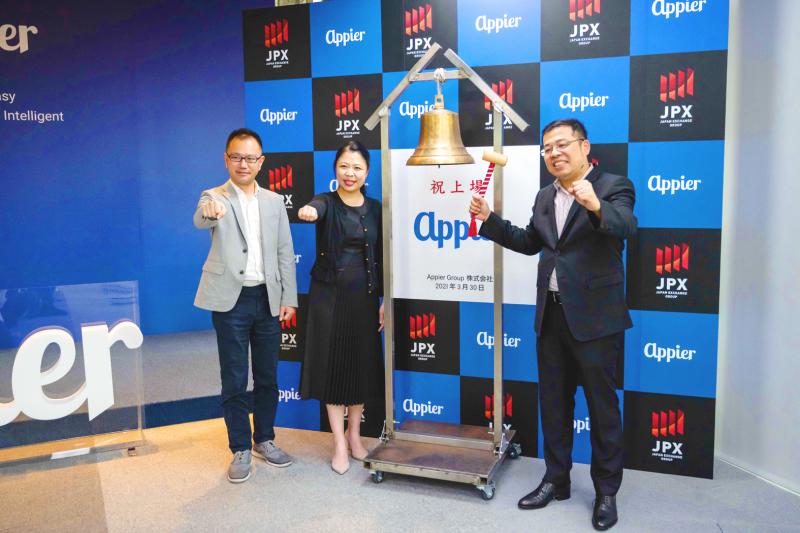Shares of Appier Group Inc (沛星互動科技), which offers artificial intelligence (AI)-based software, yesterday rose above their listing price in the company’s trading debut on the Tokyo Stock Exchange, proceeding to raise ¥29.8 billion (US$271 million) in an initial public offering (IPO) priced at the top of its marketed range.
The Taiwanese company’s shares were priced at ¥1,600 apiece in the IPO and got a significant bounce at the open, rising as much as 37 percent in early trading before paring gains to close up 19 percent at ¥1,900.
Softbank Group Corp and ASEAN China Investment Fund III were among holders who offered shares, with Masayoshi Son’s firm holding about a 4.4 percent stake, company filings showed.

Photo: Billy H.C. Kwok, Bloomberg
While Tokyo has been attempting to attract more foreign companies amid a broader push to become a financial hub, such listings remain unusual.
Appier is the first firm from Taiwan to list in Tokyo since Trend Micro Inc’s (趨勢科技) debut in 1998, the Nikkei reported.
“Japanese investors have a high acceptance of the artificial intelligence theme and the market accounts for a large part of our revenue,” Appier cofounder and chief executive officer Yu Chih-han (游直翰) said in a news briefing, explaining why the firm chose Japan.
Appier’s debut comes amid a broader sell-off in technology shares as investors rotate out of loftily valued growth stocks into more economically sensitive sectors, such as banking.
Chinese tech names have especially slumped due to a combination of rising interest rates and increased regulatory scrutiny in the US and China.
The listing on the Mothers market follows the debut of Internet giant Baidu Inc (百度) in Hong Kong on Tuesday last week.
“Many software companies opt for the US market because software valuations tend to be higher there, but successful listings in other markets could begin to open up other opportunities for companies to consider,” Bloomberg Intelligence analyst Matthew Kanterman said.
Last week, Appier and shareholders sold 18.6 million shares, after marketing them at ¥1,400, ¥1,500 or ¥1,600 apiece.
Appier said that its AI-based software is used by customers, including Alphabet Inc, Toyota Motor Corp and Estee Lauder Co, to improve profitability.
The company said that it plans to use the proceeds of the share sale to support growth, including funding research and development.
The company had a net loss of ¥1.45 billion on sales of ¥8.97 billion last year.
The offering was led by SMBC Nikko Securities Inc, Bank of America Corp and Mizuho Securities Co.

South Korea’s equity benchmark yesterday crossed a new milestone just a month after surpassing the once-unthinkable 5,000 mark as surging global memory demand powers the country’s biggest chipmakers. The KOSPI advanced as much as 2.6 percent to a record 6,123, with Samsung Electronics Co and SK Hynix Inc each gaining more than 2 percent. With the benchmark now up 45 percent this year, South Korea’s stock market capitalization has also moved past France’s, following last month’s overtaking of Germany’s. Long overlooked by foreign funds, despite being undervalued, South Korean stocks have now emerged as clear winners in the global market. The so-called “artificial intelligence

NEW IDENTITY: Known for its software, India has expanded into hardware, with its semiconductor industry growing from US$38bn in 2023 to US$45bn to US$50bn India on Saturday inaugurated its first semiconductor assembly and test facility, a milestone in the government’s push to reduce dependence on foreign chipmakers and stake a claim in a sector dominated by China. Indian Prime Minister Narendra Modi opened US firm Micron Technology Inc’s semiconductor assembly, test and packaging unit in his home state of Gujarat, hailing the “dawn of a new era” for India’s technology ambitions. “When young Indians look back in the future, they will see this decade as the turning point in our tech future,” Modi told the event, which was broadcast on his YouTube channel. The plant would convert

‘SEISMIC SHIFT’: The researcher forecast there would be about 1.1 billion mobile shipments this year, down from 1.26 billion the prior year and erasing years of gains The global smartphone market is expected to contract 12.9 percent this year due to the unprecedented memorychip shortage, marking “a crisis like no other,” researcher International Data Corp (IDC) said. The new forecast, a dramatic revision down from earlier estimates, gives the latest accounting of the ongoing memory crunch that is affecting every corner of the electronics industry. The demand for advanced memory to power artificial intelligence (AI) tasks has drained global supply until well into next year and jeopardizes the business model of many smartphone makers. IDC forecast about 1.1 billion mobile shipments this year, down from 1.26 billion the prior

People stand in a Pokemon store in Tokyo on Thursday. One of the world highest-grossing franchises is celebrated its 30th anniversary yesterday.